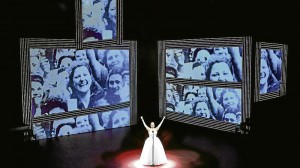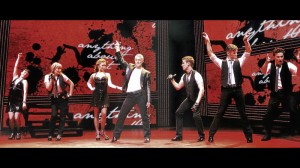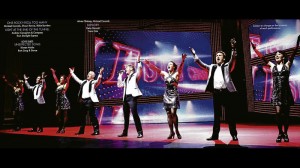Sir Andrew Lloyd Webber first gained worldwide notice for his collaborations with lyricist Tim Rice on “Jesus Christ Superstar” and “Evita” – two concept albums that became so popular, they had to be developed into full-blown theater musicals.
That’s always been his dream. As a child he was said to have written music which he played in imaginary productions in his toy theater which he himself fashioned.
More than 40 years after making contemporary musical theater hip and accessible globally, Webber is given a tribute of sorts in a concert-revue of his works – the Australian production of which has been playing for almost two weeks, until today (with matinee and evening shows) at the Cultural Center of the Philippines.
“The Music of Andrew Lloyd Webber,” which had the British songwriter’s blessings, tries to weave excerpts from 13 of his musicals (plus a Requiem Mass) into a coherent story line, although that’s virtually impossible considering their different subjects. However, since love plays a central role in most of them, it isn’t difficult to appreciate the flow of the revue.
As Webber himself wanted for it to start on a romantic note, the performance opens with principal singers Delia Hannah and Michael Cormick in a duet on “Love Changes Everything,” from “Aspects of Love.”
Mesmerizing
Hannah is particularly mesmerizing as Evita in “Don’t Cry For Me Argentina.” She sings it with a dramatic flair that doesn’t go out of bounds.
Tricia Crowe easily stands out with her soaring soprano, especially in her duet with Cormick in “The Phantom of the Opera/Music of the Night.”
The placing of four big light-emitting diode (LED) screens as the stage’s backdrop is a neat trick that junks the necessity of mounting cumbersome sets in a concert about West End/Broadway musicals.
Webber himself appears on the screens several times in a videotaped interview, in which he explains his love of classic musical theater and why he was inclined to add, for instance, elements of pop and rock in a bid to push what he called the “backward” nature of British stage shows in the late 1960s and early ’70s.
Samples of those efforts are seen on “Rock ’n’ Roll Too Many” and “Light at the End of the Tunnel” from 1984’s “Starlight Express,” although a few of the eight-member cast are not exactly impressive in the boogie dance steps.
But the nine-piece orchestra conducted by Paul White, who doubles on first keyboards, is marvelous. It provides faithful renditions of the original music in the plays – lush and sweeping on songs from “Phantom,” but humbly toned down with a lone acoustic guitar in “I Don’t Know How To Love Him” from “Superstar.”
It is hard to avoid comparing Yvonne Elliman’s original version with Alinta Chidzey’s interpretation – the latter’s seems lacking in depth and is further hampered by the absence of images from “Superstar,” which the LED screens effectively did for most of the other numbers.
Overall, the show successfully affirms the magic of experiencing top-rate musical theatre – “Phantom” is the longest-running musical in Broadway history, even if a few of the rest of the material got mixed reviews when they first opened.




